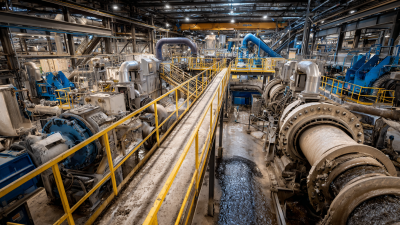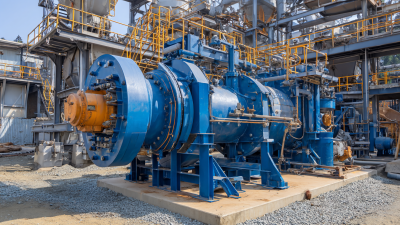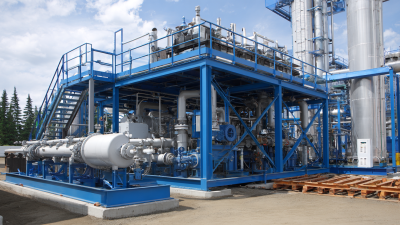strict management, quality first, quality service, and customer satisfaction


When it comes to the oil and gas world, picking the right separator is a big deal. It’s pretty much how companies boost their efficiency and make sure the resources they pull out are top quality. At Shanghai Shangjiang Petroleum Engineering Equipment Co., Ltd., we’ve always been big on developing different kinds of separation and filtration gear that meet industry standards—no shortcuts. I’ve read a report from the Global Separator Market, and it’s pretty clear that the need for more advanced separation tech is only going to grow. They’re predicting a steady climb with a CAGR of over 5% all the way until 2027. These separators aren't just about separating oil, gas, and water—they’re absolutely critical for keeping operations running smoothly. As the industry keeps evolving, there's a real push for more robust and innovative cyclone separation tech, which is kinda our specialty right now. We’re working hard to tackle those tricky, complex separation challenges that crop up in the field. Picking the right separator isn’t just about efficiency; it also helps us move toward more sustainable practices, which is a win-win all around.

When you're choosing the right separator for industrial use, it's super important to get a good handle on the different types out there. Honestly, professionals need to weigh options like cyclone separators, membrane filters, and centrifuges—each one is designed for specific separation jobs. Take cyclone separators, for example—they use centrifugal force to kick out particles from fluids. They're especially handy in the oil and gas world, where getting rid of solid stuff quickly is key to keeping the equipment running smoothly and maintaining good production quality.

As a company that’s been at the forefront of developing separation and filtration gear, Shanghai Shangjiang Petroleum Engineering Equipment Co., Ltd. is really committed to delivering top-notch solutions tailored to the unique needs of the oil and gas industry. We’re always looking to improve, especially when it comes to cyclone separation tech. Our team works hard to make sure our products don’t just meet the standards—they go beyond. Working with experts in the field, industry folks can pick the right separator that fits their specific operations, helping them run more efficiently and boost productivity without a sweat.
When you're picking a separator for industrial use, there are quite a few factors you need to think about—stuff that really depends on what you'll actually be using it for. Did you know the global oil-water separator market is expected to grow from around $2.85 billion in 2024 to roughly $4.07 billion by 2032? That’s a solid increase, with a CAGR of about 4.58%. This just shows how important these separation techs are becoming, especially in industries like oil and gas. Good separation isn’t just about efficiency; it can really cut costs and help companies stay on top of environmental rules.

Plus, there’s some exciting stuff happening with separator materials lately. Things like synthetic polymer and cellulose separators are making waves, especially in energy storage and batteries. Synthetic polymer separators are helping push supercapacitors to the next level—think faster charging and discharging. On the other hand, cellulose separators are making rechargeable batteries safer, which is a big deal. When you’re choosing the right separator, you’ve gotta look at things like how the material behaves physically and chemically, and how well it performs under different conditions. Paying attention to these details can make all the difference, whether you're aiming for a smooth operation or just trying to get the most out of your system.
When you're trying to pick the right separator for industrial use, it’s really important to get a good handle on the material’s properties—especially how its composition can impact how well it works. Stuff like density, viscosity, and thermal stability play a big role—they pretty much determine how efficient and durable the separator will be in different conditions. For example, materials that resist chemicals really well, like PPS (that's polyphenylene sulfide), tend to outperform the more traditional options, especially in tough environments. Some studies even show a 30% boost in durability when these materials are exposed to aggressive solvents.
On top of that, the mechanical qualities of the separator material really matter, too. According to a report from the International Journal of Chemical Engineering, separators made from composite materials tend to have better tensile strength and lower permeability, which means they’re more effective at their job. Like, a separator made with a mix of polypropylene and glass fiber was found to cut energy use by about 15% compared to regular separators. So, basically, picking a separator with the right material makeup—based on what your specific industrial needs are—is key to getting top performance and saving some bucks along the way.
When you're choosing the right separator for industrial use, especially in oil and gas, it’s really important to look at how effective it is. You want a separator that not only handles the required flow but also hits your target recovery rates. A report from the International Energy Agency back in 2021 highlighted that using the right separator can bump up hydrocarbon recovery by as much as 15%. That’s a pretty big deal when you think about the potential economic benefits of picking the right gear.
One key thing to keep an eye on is the separation efficiency percentage — basically, how good the separator is at splitting gases, crude oil, and water. For example, if it’s rated at 98%, that can make a huge difference by cutting down the amount of off-spec product that needs extra treatment. Companies like Shanghai Shangjiang Petroleum Engineering Equipment Co., Ltd. are focused on improving cyclone separation tech all the time, aiming to boost performance and cut costs.
Quick tip: Make sure to check your feed conditions, like flow rate and what’s in it, because these factors really influence how well your separator works. Also, don’t forget that regular maintenance and tweaking your setup can really help keep things running smoothly. Staying on top of this means your equipment stays up to industry standards and runs as efficiently as possible.
When you're picking out the right separator for industrial use, you can't ignore regulatory standards and compliance. These days, industries are under a lot of scrutiny when it comes to protecting the environment, so making sure your separators meet the necessary guidelines isn’t just a box to check—it's critical for staying operational smoothly. Interestingly, the global market for oil-water separators is expected to hit around $4.07 billion by 2032, growing at about 4.58% annually. That really shows how big of a deal compliance tech has become. These separators aren’t just some equipment sitting in the corner—they’re key players that help keep our environment in check by stopping oil-contaminated water from polluting natural ecosystems.
With tighter discharge regulations popping up—think limits like 15 ppm for oil in water—it's more important than ever to use advanced separation tech. Luckily, recent innovations have rolled out smarter flushing methods that boost separator effectiveness, helping you keep up with the rules. And honestly, staying on top of industry trends and constantly updating your technology to match new standards is just part of running a responsible, efficient operation.
**Quick Tips for Picking the Perfect Separator:**
- Take a close look at your industry’s specific rules—make sure your separator either meets or beats them.
- Keep an eye on the latest tech breakthroughs—these can make your process more efficient and easier to stay compliant.
- Stay in the loop with industry news and trends, because regulations and available technologies are always evolving, especially in the oil-water separator market.
| Separator Type | Application | Key Regulatory Standards | Efficiency Rating | Compliance Status |
|---|---|---|---|---|
| Centrifugal Separator | Oil/Water Separation | EPA 40 CFR | >95% | Compliant |
| Belt Filter Press | Sludge Dewatering | NFPA 654 | >90% | Compliant |
| Disc Stack Separator | Food Processing | FDA Title 21 | >98% | Compliant |
| Hydraulic Separator | Water Treatment | ISO 9001 | >85% | Compliant |
| Coalescing Separator | Oil Separation in Waste Water | ASTM D3940 | >97% | Compliant |
When you're looking into investing in separators for industrial processes, it really pays off to do a thorough cost-benefit analysis. Trust me, this is key if you want to get the most bang for your buck. The converter market’s booming — it’s projected to hit around $23.87 billion in 2023, and is expected to grow at roughly 8.47% each year through 2031. That just goes to show how crucial choosing the right equipment is. Putting your money into high-quality separation tech can seriously boost your operational efficiency and save you long-term costs. This is especially true in industries like oil and gas, where having reliable separation solutions makes a big difference in productivity.
Take Shanghai Shangjiang Petroleum Engineering Equipment Co., Ltd., for example. They’re really dedicated to developing cutting-edge separation and filtration gear tailored for oil and gas companies. They’re always improving cyclone separation tech, which means they’re not only keeping up with the times but also helping their clients get the most out of their investments. When you truly understand the unique needs of your industry and operations, you’re not just throwing money at new equipment — you’re making smart investments that pay off in the long run.
: The main types of separators include cyclone separators, membrane filters, and centrifuges, each designed for specific separation tasks within different industries.
Cyclone separators utilize centrifugal forces to separate particles from fluids and are particularly effective in the oil and gas sector, where they efficiently remove solid contaminants to maintain equipment and production quality.
Key factors to consider include the physical and chemical properties of the separator materials, the intended use, efficiency of oil-water separation, and environmental compliance requirements.
The global oil-water separator market is anticipated to grow from $2.85 billion in 2024 to $4.07 billion by 2032, with a compound annual growth rate (CAGR) of 4.58%.
Material properties such as density, viscosity, thermal stability, and chemical resistance directly influence the efficiency and longevity of separators in various environments.
Synthetic polymer separators enhance rapid charge and discharge capabilities in supercapacitors, while cellulose separators improve safety in rechargeable batteries.
Separators made from composite materials exhibit improved tensile strength, lower permeability, and enhanced separation efficiency, leading to reduced energy consumption and increased durability in challenging conditions.
Partnering with experts ensures that professionals can confidently choose the right separator that aligns with their operational needs, thus optimizing efficiency and productivity.
Continuous improvement in separation technologies focuses on enhancing products to not only meet but exceed industry standards, ensuring better performance across applications.
When it comes to industrial setups, picking the right separator isn't just a technical detail—it's a pretty big deal. It can really make or break your efficiency and help gear your operations towards your specific needs. In this article, I’ll walk you through different types of separators out there and share some tips on what to think about when you're choosing one. Things like the material properties and how they impact the separator’s performance are definitely worth considering. We also look at how to measure efficiency, so you can confidently pick a separator that works best for you.
Of course, don’t forget about the regulatory stuff—making sure your equipment checks all the boxes for industry standards is super important. Plus, doing a solid cost-benefit analysis can really pay off in the long run, helping you get the most bang for your buck and boost productivity, especially in oil and gas projects. Here at Shanghai Shangjiang Petroleum Engineering Equipment Co., Ltd., we're all about pushing forward with advanced cyclone separation tech. We know that choosing the right separator is key to getting great results in your processes.
Hope this gives you a clearer picture and some practical insights—after all, finding the right fit can really make a difference!






